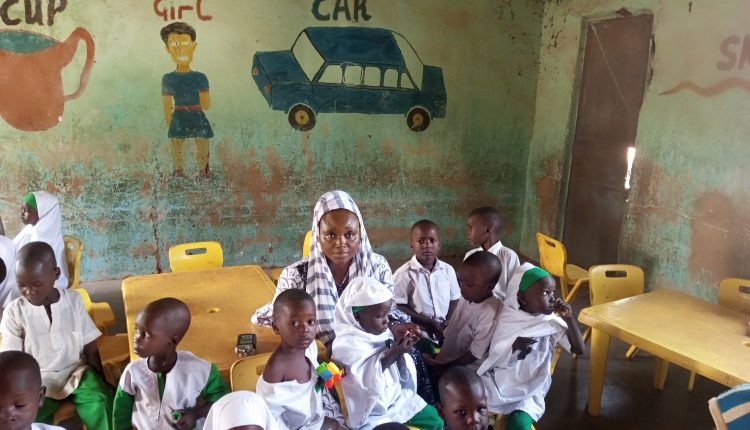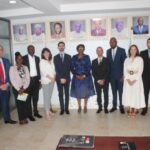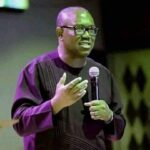By Felix Khanoba
“I do like this! I do like that!” A little pupil shouted as she threw a toy up into the air with delight as other children clustered round their teacher, who was busy singing with them.
It was cool Thursday morning at the Early Child Education (ECD) centre located at Ali Fodio Primary School, Bodinga, Sokoto State, North-West Nigeria.
As the pupils, whose ages mostly range from 3 to 6 years, sang joyfully in unison in native Hausa language, their visibly elated teacher, Binta Musa could not hide her joy.
“We play like this and they learn like this every morning. In the morning they are very active as we play they hardly forget what they learn,” said the teacher, “but when hunger sets in, many will begin to lose interest, they only learn very well in early school hours”.
Many other pupils, sitting on small plastic chairs and visibly disengaged with what their teacher was doing, were gazing at the drawings in the classroom.
“They also learn by these drawings. Some also play among themselves with what they have been taught and by doing so, they learn better,” the teacher who spoke in Hausa said through an interpreter when The AUTHORITY visited the school a few weeks ago.
The visit to the school was during a media dialogue on ECD organized by the United Nations Children’s Fund (UNICEF) in Sokoto.
According to Binta, who happens to be the only teacher at the ECD centre, the class population was only 40 in 2020 but has now grown to 150 pupils as more parents embrace early childhood education for their children
The new passion for ECD is not unconnected to advocacy and scientific research which shows that the most important period of human development is from birth to eight years old.
The importance of early learning is also entrenched in the second target of Sustainable Development Goal 4, which seeks to ensure that, by 2030, “all girls and boys have access to quality early childhood development”, hence, most parents in Bodinga through School Based Management Committee (SBMC) are leaving no stone unturned to ensure that their children are not left out.
Chairman of SBMC, Ali Fodio Primary School, Bawa Sani , said his team has devised several ways including engaging women organisations for house-to-house advocacy to attract more children to the ECD centre.
“We initiated the platform through which we contacted the members of the public in this local government on the need to educate their children qualitatively, so, we engage women’s organisation and house-to-house strategies, our women talk to fellow women in families on the impact of education and that is the reason why we see the huge numbers of pupils in the ECE class, ” Bawa said.
During the visit to the ECD centre, it was revealed that Ali Fodio Primary School was one of the few to host ECD centre in the Bodinga Local Government Area.
Education Secretary, Bodinga Local – Lawali Na’Akka Muazu, said the area boasts of 105 basic schools but only managed to establish ECD centres in 27 primary schools, a challenge he blamed on inadequate classrooms.
Bodinga is not a small area, it has dozens of communities and an area of 564 km2. Its population in 2006 national census was put at 175,406, a figure that has probably doubled as a result of massive increase in population of the area.
But the poor number of ECD centres in Bodinga did not come as a surprise to many going by national data. According to UNICEF, only 36 percent of children in Nigeria attend early childhood education.
UNICEF education specialist, Yetunde Oluwatosin, said the percentage accounted for one in every three children.
“In Nigeria, only one in three children (36 per cent) attend, but at least 10 million children are not enrolled,” Oluwatosin said during the media dialogue in Sokoto which was organised by UNICEF in collaboration with the Child Rights Information Bureau (CRIB) of the Federal Ministry of Education.
Oluwatosin, who spoke on the great importance of early childhood, said it is a critical period that any country must pay attention to, as doing so would improve the economic outcome of the child.
“It has been observed that a large inequalities persist between the poorest children and the richest children’s ECE attendance rate translating to 8 per cent and 87 per cent, respectively.
“Globally, fewer than one in three children ages three to four attend ECE.
“In West and Central Africa, only one in four (24 per cent) attend ECE,” Oluwatosin said, even as she brought to bear some of its major challenges in the country.
“If you look at it, from the 2018 National Personnel Audit (NPA) of the Universal Basic Education Commission (UBEC), we have over seven million learners but 154,000 teachers.
“This pupils/teachers ratio is low, and we must do something to improve this. This disparity is there, and we are still far behind in achieving the SDG goals,” she said, a view corroborated by
Geoffrey Njoku- UNICEF Communication Specialist.
Njoku said relevant stakeholders in the Nigerian education sector need to do more as ECE holds the magic wand for robust child’s development.
He passionately appealed for a renewed focus on issues that have to do with education and health of children to bring about a brighter future in the country.



